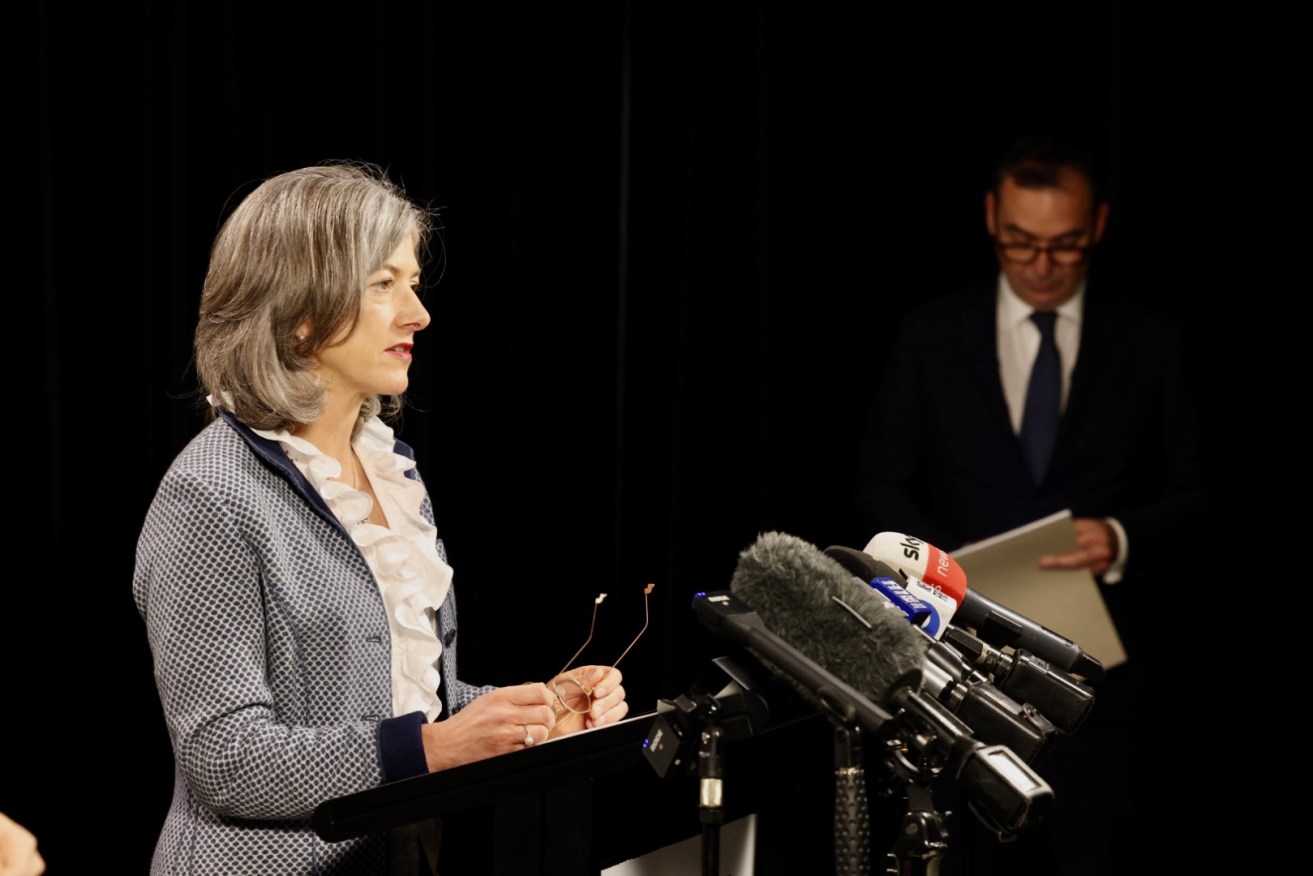SA imposes new rules on masks, crowds, drinking and singing
Masks must be worn indoors in high risk settings, private gatherings will be capped at 150 people and licensed premises will return to a one person per two-square-metre density cap with a ban on drinking alcohol while standing indoors, under a series of restrictions to be reimposed in South Australia from midnight.

Chief public health officer Professor Nicola Spurrier announcing new restrictions with Premier Steven Marshall. Photo: Tony Lewis/InDaily
Premier Steven Marshall told reporters this afternoon that Australia had entered a “critical point” in its fight against a series of outbreaks of the highly contagious delta strain of COVID-19, and South Australia had “no alternative but to take… pre-emptive action in South Australia to keep our state safe and our economy strong”.
He announced from midnight tonight, a range of internal restrictions will be reimposed.
They include:
- Mandatory mask wearing in “high risk settings” such as in hospitals, residential aged care facilities and personal care settings, such as hairdressers and beauty salons
- Mandatory mask wearing in indoor seated entertainment venues
- Recommended mask wearing on public transport, including in Ubers and taxis
- A 150 person cap at private gatherings in homes and halls, including for weddings and funerals
- A maximum density of one person per two-square-metres at licensed premises
- A ban on drinking alcohol while standing indoors at licensed venues
- A ban on buffets and shisha bars
- A ban on singing – except for performers or at educational facilities
Marshall said authorities hoped the restrictions would only need to be in place for one week.
“The hallmark of our success to date in South Australia has been the partnership, really, between the people of South Australia and the restrictions that we’ve put in place,” he said.
“We have the lowest level of restrictions in Australia, in fact, even after these restrictions are put in place I think we still have the lowest level of restrictions in Australia.
“We have to be very vigilant at the moment.
“The alternative is a full-scale lockdown here in South Australia.”
Chief public health officer Professor Nicola Spurrier said she hoped the restrictions would not impact the state’s economy significantly.
“We know that it does have an impact and I don’t want to underestimate that, but we’ve tried to balance what the risk is for South Australia against the economic and social impacts of these restrictions,” she said.
“These will be in for… as shorter period of time as we need it.”
Police Commissioner Stevens said he expected there would be high compliance from hospitality venues once the new restrictions are brought in.
“They’ve actually done a very good job at honouring the directions that have been put in place and we expect that level of cooperation again,” he said.
“We’re not out there to issue expiation notices to people who are trying to do the right thing.
“We will provide education and support as our first step and that has been well received and we will continue to do that.”
Spurrier said that if the delta strain made its way to South Australia, an infectious person would pass the virus on to three and a half other people.
“This is probably as significant as our first wave here in Australia, but particularly because of this new variant,” she said.
Both Spurrier and Marshall pleaded with people to get tested if they develop COVID symptoms, to get vaccinated if they are eligible and to continue checking-in to venues using QR codes.
They said SA Health was currently working to try and maximise the vaccine rollout in South Australia.
South Australia reported no new cases of coronavirus today.
But new locally-acquired cases were this morning announced in New South Wales and Queensland, while lockdowns or tight restrictions have been imposed in four states as the highly contagious Delta strain sweeps the country.
South Australia yesterday slammed its border shut to Queensland, WA, the NT and the ACT, after previously locking out travellers from NSW.
Stevens said SA Police officers were allocated last night to set up checkpoints at the WA and NT borders.
He said SA Police also had a presence at Adelaide Airport, but there had been a “significant reduction” in the number of flights coming in to South Australia.
NSW recorded 18 new local coronavirus cases today, with all but one linked to existing cases.
The outbreak, which has grown to 130 cases since June 16, has prompted Greater Sydney to enter a 14-day lockdown.
Queensland is reintroducing restrictions after recording two new locally acquired cased of coronavirus.
Masks will be mandatory across large swathes of the state, home visits will be capped at 30 guests and venues will need to adhere to a one person per square metre rule.
In the Northern Territory, the outbreak linked to the Granites mine has grown to six cases, while in Western Australia, a woman who returned from Sydney has picked up the virus, prompting increased restrictions including indoor mask use.
The outbreaks have prompted a multitude of border tightening measures, including South Australia’s closure to all jurisdictions except Victoria and Tasmania.
However, Victorians now need to be tested for the virus on the first day they arrive in SA.
Meanwhile, SA Health revealed 29 workers from the Granites mine where a worker tested positive for coronavirus were in South Australia.
The worker at the mine, which is 540-kilometres north-west of Alice Springs, tested positive on Friday after about 900 fly-in fly-out workers had left the site to return to their homes across Australia.
All the workers in South Australia have been tested and returned negative results.
They have been asked to quarantine at their home with their families for 14 days.
“From that risk perspective, I’m quite pleased that that’s all under control,” Spurrier said.




